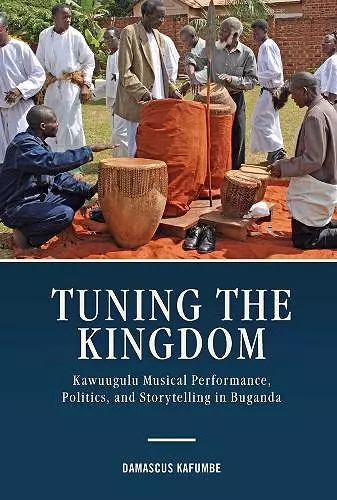Tuning the Kingdom
Kawuugulu Musical Performance, Politics, and Storytelling in Buganda
Format:Hardback
Publisher:Boydell & Brewer Ltd
Published:30th May '18
Currently unavailable, and unfortunately no date known when it will be back

Examines how the Kawuugulu Clan-Royal Musical Ensemble uses musical performance and storytelling to manage, structure, model, and legitimize power relations among the Baganda people of south-central Uganda. Tuning the Kingdom draws on oral and written accounts, archival research, and musical analysis to examine how the Kawuugulu Clan-Royal Musical Ensemble of the Kingdom of Buganda (arguably the kingdom's oldest and longest-surviving performance ensemble) has historically managed, structured, modeled, and legitimized power relations among the Baganda people of south-central Uganda. Damascus Kafumbe argues that the ensemble sustains a complex sociopolitical hierarchy, interweaving and maintaining a delicate balance between kin and clan ties and royal prerogatives through musical performance and storytelling that integrates human and nonhuman stories. He describes this phenomenonas "tuning the kingdom," and he compares it to the process of tensioning or stretching Kiganda drums, which are always moving in and out of tune. Even as Kawuugulu continues to adapt to the rapidly changing world around it, Tuning the Kingdom documents how Kawuugulu has historically articulated and embodied principles of the three inextricably related domains that serve as the backbone of Kiganda politics: kinship, clanship, and kingship. Winner of the 2020 Kwabena Nketia Book Prize of the African and African Diasporic Music Section of the Society for Ethnomusicology and Honorable Mention for the 2019 Ogot Book Prize of the African Studies Association Damascus Kafumbe is Assistant Professor of Music at Middlebury College.
Kafumbe's monograph stands as a rich case study for Africanist scholars of ethnomusicology . . . [and] shows how East African social institutions of ancient provenance . . . play important roles in contemporary social and political organization in postcolonial and contemporary East Africa. -- Christina Quigley * AFRICAN STUDIES QUARTERLY *
[O]ffers a valuable insider perspective of not only the tradition of Kawuugulu, but of the other performative aspects of the kingdom of Buganda writ large. The author succeeds in showing how Kawuugulu drumming, dancing, and storytelling are inextricably linked to one another as well as to social and political life in Buganda as they embody, express, model, and structure the everyday actions and relationships of its people. * JOURNAL OF FOLKLORE RESEARCH *
There is no other book I know that does the work of this one. It is beautiful, rich in ethnographic materials, and an important intervention in the contemporary study of African music-making and meanings. -- Carol Muller, University of Pennsylvania
A monumental contribution to the undocumented history and performative expression of the Baganda's kinship, clanship, and kingship institutions, Tuning the Kingdom unveils a narrative of the Kiganda monarchy as it is archived in the performance practice and storytelling of Kawuugulu music and dance. The author's maternal ties to the clan in charge of the ensemble offer him access to privileged knowledge that would be inaccessible to any other scholar. This book exemplifies how ethnomusicology can help form a springboard upon which to retrieve hidden knowledge of a culture. -- Sylvia A. Nannyonga-Tamusuza, author of Baakisimba: Gender in the Music and Dance of the Baganda People of Uganda
This is an important book. The Kawuugulu royal drums of the Buganda kingdom of Uganda carry great significance not only within the kingdom, but also for the fields of ethnomusicology and African studies. Any African court tradition that has survived into the twenty-first century merits this kind of scholarly documentation and investigation. This royal drum tradition is especially significant, given its age (at least several centuries), its role in Baganda society, and the fact that it survived political suppression from 1966-93. The author has done an immaculate job in documenting and analyzing the history and importance of the tradition within Baganda social life. -- Eric Charry, Wesleyan University
ISBN: 9781580469043
Dimensions: unknown
Weight: 424g
180 pages